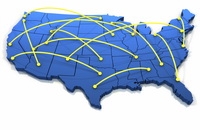Advertisement
"Sand States" Continue to See High Levels of Negative Equity

The January Mortgage Monitor report released by Lender Processing Services Inc. (LPS) found significant differences continue in foreclosure pipelines between states with judicial and non-judicial foreclosure processes. Though both foreclosure starts and sales rates have been relatively volatile at the national level due to the effects of regional processes and compliance issues, the foreclosure inventory in judicial states remains three times that of non-judicial states. However, according to LPS Applied Analytics Senior Vice President Herb Blecher, even this now-familiar judicial/non-judicial dichotomy is not as clearly defined as it once was.
"On average," Blecher said, "pipeline ratios—the rate at which states are currently working through their existing backlog of loans either in foreclosure or serious delinquency—are almost twice as high in judicial states than non-judicial states. At today's rate of foreclosure sales, it will take 62 months to clear the inventory in judicial states as compared to 32 months in non-judicial states. A few judicial states—New York and New Jersey in particular—have such extreme backlogs that their problem-loan pipelines would take decades to clear if nothing were to change."
The January data also showed that, despite an overall national trend of improvement, new problem loan rates remain high in states with large numbers of "underwater" borrowers. So-called "sand states," such as Nevada, Florida and Arizona, are still seeing high levels of negative equity (45, 36 and 24 percent of borrowers are underwater, respectively), and each of those states is experiencing higher-than-average levels of new problem loans. Additionally -- and further underscoring the differences seen between judicial and non-judicial states -- new problem loan rates in non-judicial states declined slightly over the last six months, while increasing almost 20 percent in judicial states.
"More recently, certain non-judicial states, such as Massachusetts and Nevada, have enacted 'judicial-like' legislative and/or legal actions which have greatly extended their pipeline ratios. Nevada's 'time to clear' has extended from 27 months in January 2012 to 57 months as of January 2013. The change in Massachusetts has been even more pronounced. Since June of last year, its pipeline ratio has gone from 75 to 171 months. As California's recently enacted Homeowner's Bill of Rights is closely modeled on the Nevada legislation, we'll be watching that state closely over the coming months to gauge its impact, as well."
As reported in LPS' First Look release, other key results from LPS' latest Mortgage Monitor report include:
Total U.S. loan delinquency rate: 7.03 percent
Month-over-month change in delinquency rate: -2.03 percent
Total U.S. foreclosure pre-sale inventory rate: 3.41 percent
Month-over-month change in foreclosure pre-sale inventory rate: -0.82 percent
States with highest percentage of non-current loans: FL, MS, NJ, NV, NY
States with the lowest percentage of non-current loans: MT, AK, WY, SD, ND
About the author





